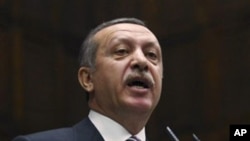Turkish Prime Minister Recep Tayyip Erdogan, in a speech to his parliamentary deputies Tuesday, said his country had lost confidence in the Syrian leadership.
His comments follow the attacks Saturday by pro-government demonstrators on Turkish diplomatic missions in Syria. Tensions between the two former close allies continue to escalate as Ankara increases its support for the Syrian opposition.
In the speech, Mr. Erdogan and launched an attack against President Bashar al-Assad. Addressing Mr. Assad disrespectfully by his first name, Bashar, Mr. Erdogan said a future cannot be built on the blood of oppressed people and that the Syrian leader will pay the price sooner or later. Mr. Erdogan said history will remember such leaders as those "feeding on blood," and that Mr. Assad was well on his way to opening that page.
Bilateral tensions increased after pro-Assad supporters attacked diplomatic missions across Syria on Saturday. Ankara is demanding a full apology and the prosecution of those responsible for the attacks. Following the attacks, Turkish Foreign Minister Ahmet Davutoglu on Sunday formally met with representatives of the opposition Syrian National Council.
Turkish Foreign Ministry spokesman Selcuk Unal said Ankara had agreed to the opposition's request to open an official office.
"They will have an office in Turkey. The Turkish foreign minister, Mr. Davutoglu, received the Syrian council members for a second time. They have explained their views of the situation in Syria. We told this group that the fate of Syria will be determined by the people. We also suggested they stay in peaceful methods," Unal said.
Ankara has in the past few months allowed the Syrian opposition to operate in Turkey. Last month, various opposition groups formed the Syrian National Council at a meeting in Istanbul.
"It's playing an interesting bittersweet game. It's saying it's not arming the opposition in any way, but it's clear on the other hand it's providing protection and the venue to meet. And now Davutoglu has actually sat down and met with the opposition. I think Turkey is in final analysis in pursuing these contacts with the opposition. It considers that Assad's time is over and [that] it's just a matter of time," said diplomatic correspondent Semih Idiz for the Turkish newspaper Milliyet.
While Ankara says it only supports peaceful opposition, it is hosting the leaders and members of an opposition militia, the self-declared "Syrian Free Army." The group claims to have as many as 15,000 members fighting the Syrian army. Rumors are growing both in Turkey and the wider region that Ankara could intervene militarily and create a safe haven in Syria for opponents of the Assad government.
Turkish Foreign Ministry spokesman Unal, when asked, would not rule out such a possibility, but he said it is not on the agenda now.
"Like every country, Turkey, the Turkish government, has its contingency plans for every eventuality, on every occasion and [on] every issue," Unal said.
Mr. Erdogan had indicated that sanctions would be announced last month. But the October earthquake in the Turkish city of Van saw Ankara distracted. Now Syria is back at the top of the agenda. But diplomatic columnist Idiz says with its 800-kilometer border with Syria and the rapidly deteriorating situation there, Ankara is becoming increasingly careful in its actions toward Damascus.
"I think Turkey is reacting to a developing situation, about which Turkey has no definite knowledge as to how it will end. Therefore Turkey feels it has to be very cautious," Idiz said.
Turkey's increasing ties with the Syrian opposition and international pressure against Damascus are seen as signs that Ankara believes the end game for President Assad has started. But observers say how that game will play out and what role Ankara will play still remains unclear.
Turkish PM: Lost Confidence in Syrian Leadership




